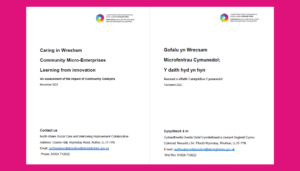The journey of our community enterprise work in Wrexham
Back in 2020, Wrexham County Borough Council (WCBC) and the Betsi Cadwaladr Health Board commissioned Community Catalysts to develop new and innovative ways of delivering care and support to create more choice for people living at home, particularly in rural areas where demand for services was already high. The partnership project sought to support people to set up their own small enterprises offering care and support to other local people – we call these community enterprises.

To lead the project, we recruited Tom Hughes as our local Wrexham Catalyst. Tom was born and bred in Wrexham and extremely passionate about the new opportunities that this way of working offered local people – both to entrepreneurs and people drawing on care and support.
The knowledge and understanding that Community Catalysts come with and the experience of working in other parts of the country have allowed us to really consider what options are available to meet what we need locally…it’s not a one size fits all model.
Steve Latham-White – Commissioning Officer at Wrexham Council
The impact of our community enterprise work in Wrexham
WCBC were keen to learn from, and evidence, the impact of the project after 18 months and commissioned the Research Innovation Coordination Hub, (who are working to review evidence-based integrated health and social care research in North Wales) to compile an independent ‘assessment of impact’ report.
Impact of Community Catalysts between 1st April 2021 – 30th September 2022:
- 53 community enterprises had been established with a total of 61 jobs created
- 248 people received care from a community enterprise – 50% of those people received personal care and 55% of community enterprises offered other flexible support enabling people to live independently at home and engage with their local community
- In September 2022, 842 hours of personal care were delivered by community enterprises every week in Wrexham

The research identified that, as community enterprises focus on their own local area, they save time and money on travel and have lower overheads – this means they charge on average £4.20 less than the average domiciliary care provider. At the time of the report, community enterprises delivered an annual direct cost saving of £58,812 to WCBC during the year.
A key factor in the growth of community enterprises in Wrexham has been the use of Direct Payments, with 35% of all Direct Payments from WCBC paid to community enterprises in 2021/22. Annual Direct Payment statistics from WCBC show that community enterprises provided care to the financial value of £121,119 during 2021/22
To collate some of the more qualitative information, the researchers used Person-Centred Community Care Inventory (PERCCI) (a short, easy-to-complete questionnaire that measures the quality of care experiences) to link with people who were drawing on different types of support across Wrexham. This evidenced that people were receiving a good standard of person-centred care generally. It also showed that though everyone in receipt of a Direct Payment was receiving a high standard of person-centred support, those supported by a community enterprise scored higher across all questions about how they felt about the person/people supporting them. You can read the full report in English here or read the report in Welsh here.
Choice and control is definitely on the increase for our citizens – we have noticed an increase in Direct Payments. The variety of options for people in the community is now clear.
Steve Latham-White – Commissioning Officer at Wrexham Council
Fast forward to August 2024
There are now 80 community enterprises offering care and support to people in their homes in Wrexham. Cost savings to WCBC have increased and more people are benefitting from a range of local support.
Tom is now using his skills to manage a range of projects across Wales and England and we have recruited Annette Thomas to continue leading the project in Wrexham. WCBC evidenced their commitment to our approach by funding and additional year of the project which enabled us to employ Annette to focus on supporting enterprises to launch in the rural areas of the Borough to help them recognise the value of setting up their own community enterprise. 
There is a vibrant network of community enterprises across Wrexham who meet up, share successes, support and encouragement. It’s a wonderful community to be a part of and acts as an inspiration and support network to others looking at setting up their own community enterprise in the area.
Tom Hughes – Project Manager (previous local Catalyst), Community Catalysts
Factors of success
So, why has the project worked so well in Wrexham?
Strategic oversight
From the beginning, we’ve had ongoing strategic buy-in and a real commitment to the approach which led to an extension of the initial 2-year contract for a further 18 months. There has also been a strong commitment to ongoing stakeholder meetings via the Community Catalysts “Change Groups” which have supported effective system and culture change necessary for a successful project at every level. Steve, the Commissioning Officer, also regularly attends the Community Catalysts’ Shared Learning Network where representatives from the Council areas who have a contract with Community Catalysts come together to learn from each other.
Our Shared Learning Networks are an opportunity to share all the good stuff that’s happening across the Councils we’re working with – it saves any wheels being reinvented!
Helen Allen – Director of Community Enterprise, Community Catalysts
Direct payments and funding
As a direct impact of the project, WCBC agreed a fair Direct Payment rate which recognises the specific overheads of sole traders compared to employed Personal Assistants. WCBC provided start-up funding for community enterprises too which has enabled entrepreneurs to set up quickly by having access to a small amount of money to fund things like DBS checks, public liability insurance, training, registration with the Information Commissioner’s Office.
Our wider work in Wales…and a look into the future
In recent years, we have expanded our community enterprise projects across Wales through partnerships with more local Councils; this has included work in Powys, Wrexham, Denbighshire, and more recently in Gwynedd, Rhondda Cynon Taf and Cardiff. In all these areas we have developed (or are currently developing) capacity in the sector so that more local people can benefit from new types of support, helping them to live good lives at home and connect with other people in their local community. We have also supported Pembrokeshire and Torfaen in their ventures in developing local options for local people.
Recently, Community Catalysts met with the Welsh Government, Care Inspectorate Wales (CIW), Social Care Wales and ADASS Cymru to discuss the impact of our work across the country. We look forward to building on these partnerships to ensure that support from community enterprises continues to play a positive role within the care eco-system, bringing more options alongside the more traditional Personal Assistant roles and commissioned home care agencies. If you’re interested in doing something similar in your own area do get in touch helen.allen@communitycatalysts.co.uk
By Helen Allen – Director of Community Enterprise
